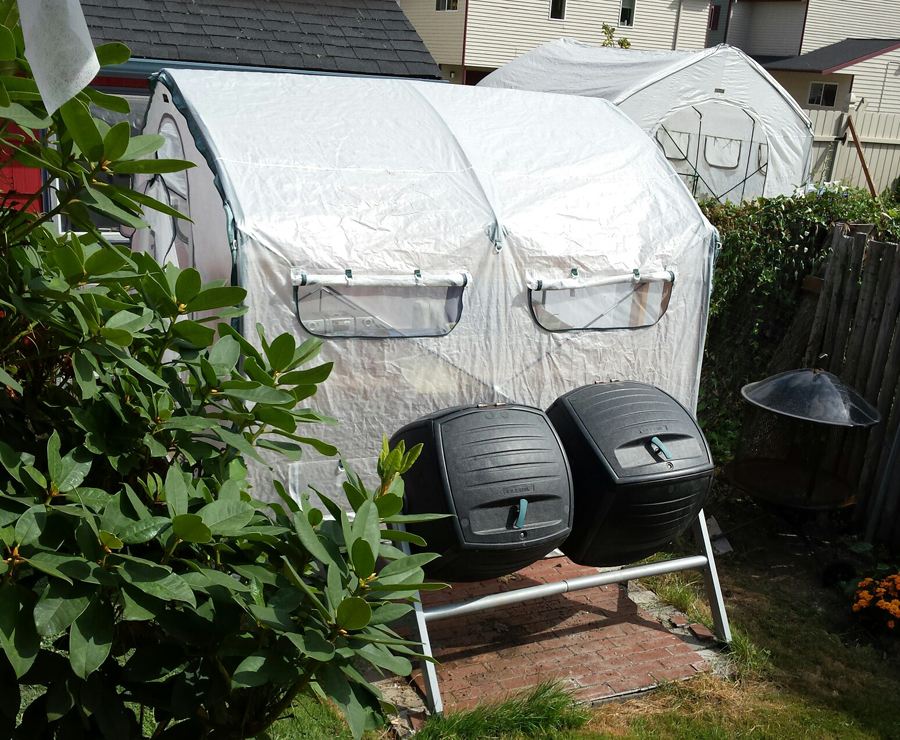By Nina Huang
Northwest Asian Weekly

Compost bins in Phon Thach’s and Jim Driscoll’s yard. (Photo by Jim Driscoll)
Even though composting is the law, it’s not always easy to obey it.
Composting can be especially difficult if you live in an apartment. On the other hand, it can be easy and beneficial if you’re in a house.
Phon Thach and her husband Jim Driscoll started composting a few years ago because they didn’t want to waste food. They were also inspired to compost after receiving a reminder from the City of Seattle.
Thach explained that she composts almost all the leftovers from food, vegetables, and fruits. The fun part is that they use the compost to grow their garden.
Thach and Driscoll are both retired, but they love working on their garden together at their home in South Park. They often receive a lot of compliments about their garden.
“I thought it was a good idea to clean all the leftover foods. When we do this, we clean the fruits and vegetables, and I love the compost because it helps grow our delicious vegetables in the garden.”
The couple grows berries, tomatoes, garlic, onions, broccoli, kohlrabi, and even flowers.
“We eat and give away what we grow to our neighbors,” Thach said.
She spends a lot of time cleaning the leftovers for composting to prevent odor and pests from invading their garbage.
Small business owner Marc Russell is another avid composter. He’s had a unit in the Fujisada building since 2000 and has been composting for about a year.
“Not only is it the law, it is easy and the right thing to do. Once a person learns how to do it the correct way, he or she will probably be amazed at how much stuff was going in the trash,” Russell said.
Russell recommends buying compostable bags like BioBag to compost.
“Thirteen gallon bags work best for me because it’s small and I can keep it in my refrigerator’s freezer, smell-free, until it is full,” he advised.
Russell explained that many people make the mistake of throwing away compost in non-compostable plastic bags.
“I’m constantly dumping the compost in and throwing away the plastic bag. Then I must immediately go wash my hands,” he explained.
Susan Ammon, who is newer to composting, does the exact same thing when she composts daily. She puts her compost in produce bags, takes it downstairs, and dumps the compost out of the bag and throws the plastic bag in a separate bin. Her building conveniently has different bins for residents to separate out compost and used plastic bags.

Tomatoes in Phon Thach and Jim Driscoll’s garden. (Photo by Jim Driscoll)
Making it convenient to compost
Since moving to Hirabashi Place in the International District in April, Ammon has learned to compost. In the past, she always thought composting was a difficult thing to do.
Hirabashi Place is the first building that Ammon has lived in that actually provided compost bins.
When she used to live in a house in West Seattle, Ammon and her roommate could have composted, but they didn’t. They would just throw food down the garbage disposal. Also, Ammon attributed it to the lack of knowledge about how to compost the right way. They also didn’t have access to compost bins, so even if they tried, they didn’t know where to throw it.
“Composting can be time consuming and it’s easier to just throw everything out, but there’s no excuse not to compost anymore,” she said.
Ammon admitted that when she received mail from Seattle Public Utilities about composting in the past, she didn’t pay much attention. But after moving into her current building, the management emphasized that they were trying to go green and more information was shared with tenants.
“If your peers are doing it, then people follow along with what everyone else is doing. It’s our responsibility to take care of what we have for the environment. Reminding people that composting is easy and how much impact one person can make might encourage people to compost more,” she explained.
Ammon said that the property managers do a great job of putting up signs — encouraging and teaching people how to compost. They even have flyers in different languages for the residents.
“Having access to the compost bin makes a huge difference,” she reiterated.
Too much of a hassle?
Not all apartment buildings in Seattle make it that easy or convenient for residents to compost.
Fuzz Azni has lived in his apartment building in Columbia City for a year. When he used to live in a single family house that had a yard waste bin, he composted, but he doesn’t anymore due to inconvenience.
“Currently, I have to walk to the other end of my building, which takes about five minutes. Whereas the trash chute is right at the end of the hallway,” he said.
Azni’s building does have a compost bin along with recycling bins, but the distance makes composting cumbersome.
Although Azni understands the importance of composting, there isn’t enough of an incentive or consequence for him to do so.
However, he did say that if buildings allocated more compost bins around the apartment, he would compost.
In addition, he mentioned that he would be more inclined to compost if the city had incentives like offering sewage or garbage rebates, or even providing compost bins and bags for everyone.
Composting may not be on everyone’s mind right now, but it could get easier for Seattle residents.
Ammon compared the act of composting to the resistance that was met when people were first asked to recycle. It may be hard to do at first, but over time, people will start to understand the ease and benefits of composting.
Nina can be reached at
info@nwasianweekly.com.



